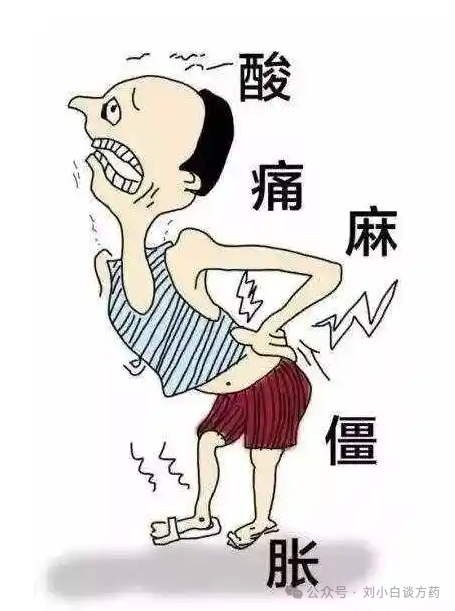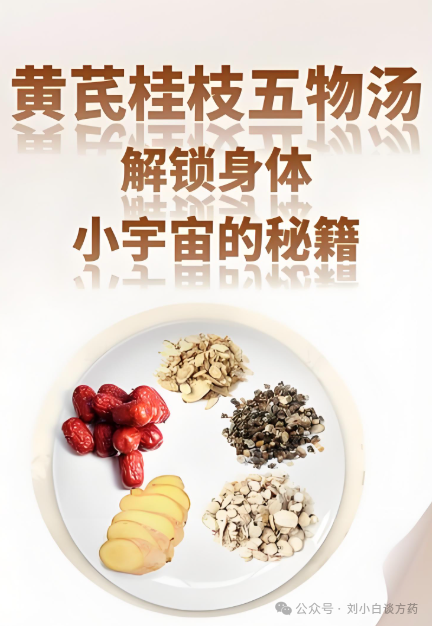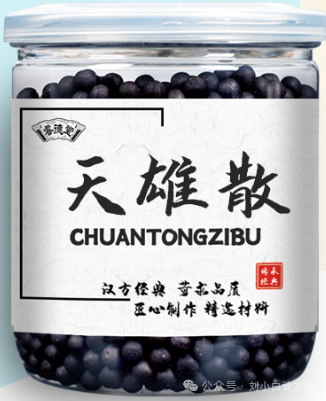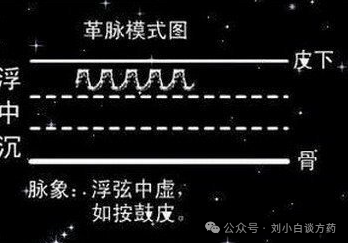Original Text:
(1)Question: How does Blood Bi syndrome occur? The Master said: For those of high status, with weak bones and abundant flesh, it is mainly due to fatigue and sweating, lying down without moving, and being exposed to a slight breeze, which leads to this condition. The pulse is slightly weak and tight at the cun (寸) and guan (关) positions, so it is advisable to needle to draw out Yang Qi, allowing the pulse to harmonize; when the tightness is released, recovery will follow.
(2) Blood Bi syndrome presents with both Yin and Yang being weak, with a weak pulse at the cun and guan positions, and a small tight pulse at the chi (尺) position. The external manifestation is numbness in the body, resembling Wind Bi syndrome, treated with Huang Qi Gui Zhi Wu Wei Decoction (黄芪桂枝五物汤).
Huang Qi (Astragalus) 3 liang, Shao Yao (Peony) 3 liang, Gui Zhi (Cinnamon Twig) 3 liang, Sheng Jiang (Fresh Ginger) 6 liang, Da Zao (Jujube) 12 pieces. Combine these five ingredients with 6 sheng of water, boil down to 2 sheng, and take 7 he (合) warm, three times a day. (One formula includes Ren Shen (Ginseng)).

(3) For a healthy man, a large pulse indicates labor, and extreme deficiency also indicates labor.
(4) A man with a pale complexion indicates thirst and loss of blood, sudden palpitations, and a floating pulse indicates internal deficiency. A man with a weak, deep, and wiry pulse, without cold or heat, shortness of breath, and difficulty urinating, with a pale complexion, sometimes having closed eyes, along with epistaxis and fullness in the lower abdomen, indicates labor causing this condition. The pulse is floating and large, with coldness in the hands and feet, severe in spring and summer, and recovering in autumn and winter, with Yin cold essence naturally emerging, unable to move. A man with a floating, weak, and rough pulse indicates infertility, with clear and cold essence.
(5) For those with seminal loss, the lower abdomen is tight and urgent, with cold sensations in the genitals, dizziness (or pain around the eyes), hair loss, and a pulse that is extremely weak and slow, indicating loss of essence and blood. If the pulse is slightly tight and rough, it indicates seminal loss in men and dream intercourse in women, treated with Gui Zhi Jia Long Gu Mu Li Decoction (桂枝加龙骨牡蛎汤).
Gui Zhi (Cinnamon Twig), Shao Yao (Peony), Sheng Jiang (Fresh Ginger) each 3 liang, Gan Cao (Licorice) 2 liang, Da Zao (Jujube) 12 pieces, Long Gu (Dragon Bone) and Mu Li (Oyster Shell) each 3 liang. Combine these seven ingredients with 7 sheng of water, boil down to 3 sheng, and take in three warm doses.
Tian Xiong San Formula (天雄散方)
Tian Xiong (He Shou Wu) 3 liang (processed), Bai Zhu (White Atractylodes) 8 liang, Gui Zhi (Cinnamon Twig) 6 liang, Long Gu (Dragon Bone) 3 liang. Grind these four ingredients into a powder, take half a qian (钱) with water, three times a day, and if unknown, slightly increase the dosage.
(6) For men aged fifty to sixty, if the pulse is large, it indicates labor, and if there are symptoms like intestinal sounds, or a knife-like sensation in the back, it is all due to labor.
(7) A pulse that is deep and small and slow is called ‘losing Qi’; if the person walks quickly, they will wheeze, with cold hands and feet, abdominal fullness, and in severe cases, diarrhea and indigestion.
(8) A pulse that is wiry and large indicates reduction; a large pulse indicates emptiness, reduction indicates cold, and emptiness and cold clash, this is called ‘Ge’ (革). For women, it indicates postpartum leakage; for men, it indicates loss of blood and essence.
Analysis:

The first section discusses the causes, pulse characteristics, and treatment methods for Blood Bi syndrome. Those who lack labor or exercise, appearing muscular but with weak bones, insufficient Ying and Wei Qi, and loose pores, have a weak resistance to pathogens. Such individuals easily sweat with slight exertion, which further relaxes the pores. Coupled with excessive thinking and poor sleep, their resistance weakens further, making them susceptible to even slight wind pathogens, leading to Blood Bi syndrome. The pulse is slightly rough, indicating weak Wei Yang, meaning that these individuals originally have insufficient Wei Yang, and the roughness indicates stagnation of blood flow. The tight pulse indicates wind-cold invasion, with the tightness only appearing at the cun and guan positions due to the lightness of the pathogen and the shallowness of the illness. However, blood flow relies on Qi; where Qi flows, blood flows. This mild form of Blood Bi syndrome can be treated simply by needling to stimulate Yang Qi, allowing for smooth blood flow, thus dispelling the wind pathogen. This is the meaning of ‘when blood flows, wind naturally dissipates’, hence it is said ‘needle to draw Yang Qi, allowing the pulse to harmonize; when tightness is released, recovery follows.’
The second section discusses the severe symptoms and treatment of Blood Bi syndrome. Both Yin and Yang are weak, emphasizing that Ying, Wei, Qi, and blood are all insufficient, thus the pulse at the cun and guan positions is weak and small, indicating cold due to a heavier and deeper pathogen. The main symptom of Blood Bi syndrome is numbness and lack of sensation in the skin, a response to wind-cold invading the blood, causing obstruction of blood flow, resembling Wind Bi syndrome with pain due to severe obstruction. This condition, due to both Yin and Yang being deficient, should not be treated solely with needling but requires herbal treatment. The method for treating Blood Bi syndrome focuses on invigorating Wei Qi and warming Yang Qi, as Qi flow leads to blood flow.Huang Qi Gui Zhi Wu Wei Decoction, which is Gui Zhi Decoction minus Gan Cao, with increased Sheng Jiang and added Huang Qi, serves as the main formula. This formula uses Huang Qi as the monarch herb to tonify the Wei Qi at the surface, nourishing the skin, warming the flesh, while Gui Zhi releases the muscle layer from wind and promotes Yang. The combination of Huang Qi and Gui Zhi solidifies the surface without retaining pathogens, tonifying while also promoting flow, invigorating the righteous Qi to dispel the evil Qi, assisted by Shao Yao to nourish Yin and harmonize Ying, thus eliminating Blood Bi syndrome. This treatment emphasizes the principle of treating blood before wind, with Sheng Jiang and Da Zao harmonizing Ying and Wei. The heavy use of Sheng Jiang is because it can disperse cold and assist Huang Qi and Gui Zhi in invigorating Wei Yang, dispersing surface pathogens, thus the entire formula has the function of tonifying Qi and blood, warming and promoting Wei Yang, dispersing cold and eliminating Bi syndrome.

The third section discusses the pulse characteristics of deficiency labor. The large pulse here refers to a large but weak pulse, specifically a large pulse when lightly pressed, but soft and weak when pressed harder, indicating an external appearance of abundance but internal deficiency. Since the kidney governs essence, insufficient essence leads to Yin deficiency, and Yin deficiency leads to Yang floating, hence the pulse is large but weak. An extremely weak pulse refers to a pulse that is soft with light pressure and even weaker with heavy pressure. This is due to internal injury to essence and Qi deficiency, leading to an inability to propel the pulse. However, since Yang Qi is not floating, the pulse is neither floating nor large. Although the large and extremely weak pulses differ in appearance, both indicate internal injury to essence and deficiency labor. Thus, the original text states: ‘a large pulse indicates labor, and extreme deficiency also indicates labor.’ This article mainly points out that any appearance of a large or extremely weak pulse is a manifestation of deficiency labor, regardless of whether clinical symptoms are obvious. Pulses that are primarily deficient in essence and blood or those with Yin damage and Yang deficiency often present as large and weak pulses, including the floating (but weak) pulse and the rough pulse mentioned later, while those primarily weak in Yang Qi or with Yang damage and Yin deficiency often present as extremely weak pulses, including thin, slow, deep, and tight pulses. Therefore, the ‘large’ and ‘extremely weak’ pulses are the general characteristics of deficiency labor.
The fourth section discusses the symptoms of blood loss. Blood deficiency cannot normally nourish the face, hence the pale complexion without luster. Blood deficiency also leads to insufficient body fluids, hence thirst. ‘Loss of blood’ refers to blood loss, indicating blood deficiency, which cannot nourish the heart, leading to palpitations. Blood loss affects Qi, and Qi deficiency leads to wheezing; this type of deficiency wheezing generally occurs after slight exertion, alleviating when sitting or lying down, hence the term ‘sudden wheezing and palpitations’, which differs from wheezing caused by fluid retention or heat. A floating pulse indicates floating but weak, or floating and large but weak pulse, caused by blood deficiency and Qi floating, similar to the large pulse mentioned in the third section, which belongs to Yin deficiency and Yang floating, but with different degrees of severity. There is a fundamental difference from the floating tight or floating slippery and strong pulses of exterior conditions or those caused by heat pressing on the lungs. Thus, the original text particularly points out ‘internal deficiency’. The main spirit of this section is to indicate that blood deficiency can present with a pale complexion, thirst, sudden wheezing and palpitations, and a floating weak pulse, hence the original text repeatedly points out blood loss and internal deficiency, which must be distinguished from thirst, wheezing, and floating pulse caused by excess conditions. Qi is the commander of blood, and blood is the mother of Qi; where Qi flows, blood flows, and where blood arrives, Qi follows. For those who have lost blood, it primarily leads to Qi deficiency and insufficient heart and lung Qi, hence causing wheezing upon exertion, which is a common clinical manifestation. Using Ren Shen (Ginseng) and Huang Qi (Astragalus) can have significant effects, while using kidney tonics may not be effective.Yin and blood deficiency is the main pulse pattern. The weak, deep, and wiry pulse indicates a pulse that is deep and wiry but weak, with deep indicating internal conditions. [Interpretation of the Classics] A wiry pulse that is weak indicates a sign of Yang deficiency and internal cold. There is no cold or heat, indicating no external cold or heat symptoms, thus it is an internal injury. The kidney is the source of pre-heaven essence, and internal storage of Yuan Yang. If kidney Qi is deficient, it cannot hold Qi, leading to shortness of breath; Yang deficiency cannot warm the internal organs, leading to abdominal tightness; kidney Yang deficiency cannot warm Yang and transform Qi for urination, hence difficulty urinating and fullness in the lower abdomen; Yang deficiency combined with Yin and blood deficiency cannot nourish the face, leading to a pale complexion; Yin deficiency cannot store Yang, leading to floating Yang, hence closed eyes and epistaxis.
Yin and Yang deficiency pulse pattern. Insufficient Yin essence leads to floating Yang. Yin deficiency cannot store Yang, hence Yang Qi floats, leading to a floating and large pulse, with hot hands and feet. In spring and summer, the wood and fire are intense, which is not beneficial for Yin, leading to further Yin deficiency and floating Yang, hence worsening the condition; in autumn and winter, metal and water generate Yin, which can help store floating Yang, hence the condition improves. The kidney governs storage and is the source of sealing. The front Yin is governed by the kidney; due to Yang deficiency, it cannot warm the front Yin, hence it is cold; Yang deficiency cannot secure Yin essence, hence essence leaks. The kidney also governs bones; if the kidney is deficient, the bones are weak, leading to soreness and weakness in the waist and legs, and lack of strength in movement.
Essence deficiency and blood cold, with insufficient Yang Qi, lead to clear and cold essence. Male essence and female blood, when abundant, can form a fetus; now the essence is sparse and cold, hence unable to conceive, leading to infertility.
The fifth section discusses the treatment of seminal loss due to Yin and Yang deficiency. Patients with seminal loss often initially have dreams causing it, known as nocturnal emissions, which are caused by the stirring of fire. If not resolved for a long time, it gradually leads to emissions without dreams, known as slippery seminal loss. ‘Loss of essence’ refers to those who have long suffered from seminal loss, with excessive consumption of seminal fluid, leading to Yin damage and Yang deficiency. Due to lower Jiao Yang deficiency, it cannot warm the internal organs and meridians, hence the lower abdomen is tight and urgent, with a cold sensation in the genitals; dizziness indicates insufficient essence and blood, unable to nourish the head and eyes; hair loss is due to blood deficiency. ‘The pulse is extremely weak and slow, indicating loss of essence and blood.’ This is an insertion, meaning that the extremely weak and slow pulse can be seen in those with seminal loss, as well as in those with blood loss or diarrhea of clear fluids. Extreme weakness is caused by insufficient essence and blood, similar to the extremely weak pulse in the third section; a rough pulse is large and hollow, also caused by severe blood and essence loss with floating Yang, while slow indicates insufficient pulse rate due to weak Yang Qi. Thus, ‘extreme weakness’, whether rough or slow, can be seen in those with seminal loss, as well as in those with blood loss or diarrhea of clear fluids, indicating both Yin and Yang deficiency. ‘The pulse shows roughness and slight tightness’ at the end, reiterating the pulse pattern and treatment for those with seminal loss. ‘Rough’ is a particle indicating that if a ‘rough’ or ‘slightly tight’ pulse is present, in men it indicates seminal loss, and in women it indicates dream intercourse, caused by Yin damage and Yang deficiency. ‘Rough movement’ refers to a rough pulse, while ‘slight tightness’ indicates a weak wiry pulse. ‘Rough movement’ indicates Yin deficiency and floating Yang, while ‘slight tightness’ indicates cold deficiency. These two pulse patterns are often seen in cases of Yin and Yang deficiency. Not only is Yin essence deficient, but it can also damage Yang Qi, leading to loss of essence; when Yang loses its nurturing of Yin, it floats and does not settle, leading to seminal loss. The loss of Yin leads to the inability to secure, hence the treatment for this condition is to tonify deficiency and regulate Yin and Yang, securing and stopping emissions. The formula used is Gui Zhi Long Gu Mu Li Decoction.This formula can treat the condition of dream intercourse and seminal loss due to Yin and Yang deficiency because Gui Zhi warms Yang, Shao Yao nourishes Yin, and the combination of Gui and Shao can warm Yang and harmonize Yin; Sheng Jiang and Da Zao assist Gui and Shao in regulating Ying and Wei; Gan Cao harmonizes the formula. Therefore, Gui Zhi Decoction can resolve exterior symptoms, regulate Ying and Wei, and treat internal symptoms by tonifying deficiency and regulating Yin and Yang; Long Gu and Mu Li function to stabilize and secure, preventing the leakage of Yin essence and the floating of Yang, thus harmonizing Yin and Yang, allowing for the resolution of all symptoms.
Tian Xiong San is a treatment for Yang deficiency and seminal loss. The original text does not specify the symptoms, suggesting it may not be a formula from Zhang Zhongjing. Tian Xiong can strengthen the fire of the Mingmen, effectively assisting Yang, serving as the monarch herb; Bai Zhu tonifies the middle and generates essence and blood; Gui Zhi assists Tian Xiong in supplementing Yang deficiency; Long Gu secures the leaking Yin essence and restrains floating Yang. The entire formula warms and tonifies the spleen and kidney, secures and stops emissions, thus this formula is suitable for treating men with Yang deficiency and seminal loss, premature ejaculation, or Yang deficiency with slippery seminal loss. However, for those with both Yin and Yang deficiency, it should not be used indiscriminately.

The sixth section discusses the distinction between virtual cold and virtual heat in the same large pulse. As mentioned in this article, symptoms like back pain, intestinal sounds, or knife-like sensations in the back can all present with a large and weak pulse. The previous third section states ‘a large pulse indicates labor’, here it points out that a large pulse does not only indicate deficiency labor but can also indicate other conditions. However, these three diseases are related to a weak constitution. Generally, when a person reaches fifty or sixty years of age, their essence and Qi often decline, leading to floating Yang, which can present as a ‘large pulse’. Insufficient Qi and blood cannot nourish the muscles and bones, leading to a loss of nourishment in the Tai Yang channel, hence numbness in the back, which is a sign of aging and should not be equated with deficiency labor.
The seventh section discusses the pulse pattern of spleen and kidney Yang deficiency. ‘The pulse is deep and small and slow’ refers to a pulse that is fine and slow when pressed heavily. This is a manifestation of spleen and kidney Yang deficiency. The kidney governs the intake of Qi; if the kidney is deficient, it cannot hold Qi, hence when walking quickly or with slight exertion, the person will wheeze. The kidney is the source of pre-heaven essence, and internal storage of Yuan Yang; if kidney Yang is deficient, spleen Yang is also deficient, and the spleen governs the four limbs, hence Yang deficiency cannot warm the limbs, leading to cold hands and feet. Spleen Yang deficiency cannot digest food and fluids, leading to abdominal fullness, diarrhea, and indigestion. In treatment, the focus should be on warming and tonifying spleen Yang, while also addressing kidney Yang, invigorating spleen Yang, and restoring healthy function, which is of utmost importance. However, spleen Yang relies on kidney Yang, so warming and tonifying kidney Yang can also restore spleen Yang.
The eighth section explains the morphology of the Ge pulse and its mechanism of occurrence. The Ge pulse includes both wiry and large pulse patterns. Generally, a wiry pulse remains unchanged upon pressure, while the Ge pulse’s wiry nature weakens upon pressure, hence ‘wiry indicates reduction’. Generally, a large pulse is strong and powerful, but the Ge pulse is large and hollow, resembling a Li pulse. Therefore, a large pulse indicates deficiency. A wiry pulse that weakens upon pressure indicates a sign of Yang deficiency and internal cold, hence ‘reduction indicates cold’; a large and hollow pulse indicates deficiency of essence and blood. Thus, it is said: ‘deficiency and cold clash, this is called Ge’. Due to excessive blood loss in women postpartum or leakage, or excessive blood loss in men, it leads to significant damage to Yin Qi, causing floating Yang, hence the pulse appears large and hollow, resembling a Li pulse. When Yin is damaged and Yang is weakened, Yang Qi declines, leading to signs of internal cold, hence the pulse becomes wiry and weakens upon pressure. Therefore, the Ge pulse indicates deficiency of essence and blood, with damage to Yin and Yang, indicating a disease of both Yin and Yang deficiency. In terms of treatment, it is necessary to warm Yang and secure Yin.
 Conclusion: Blood Bi syndrome is a condition caused by insufficient Qi and blood, resulting in the invasion of wind pathogens and obstruction of blood flow, primarily characterized by numbness and lack of sensation in the limbs, with severe cases also presenting with mild pain. This condition differs from Bi syndrome caused by the invasion of wind, cold, and dampness, which primarily manifests in the joints with pain. Clinical differentiation is essential.Deficiency labor is a chronic weakness disease caused by various factors leading to weakness of the organs’ Yin, Yang, Qi, and blood.
Conclusion: Blood Bi syndrome is a condition caused by insufficient Qi and blood, resulting in the invasion of wind pathogens and obstruction of blood flow, primarily characterized by numbness and lack of sensation in the limbs, with severe cases also presenting with mild pain. This condition differs from Bi syndrome caused by the invasion of wind, cold, and dampness, which primarily manifests in the joints with pain. Clinical differentiation is essential.Deficiency labor is a chronic weakness disease caused by various factors leading to weakness of the organs’ Yin, Yang, Qi, and blood.

